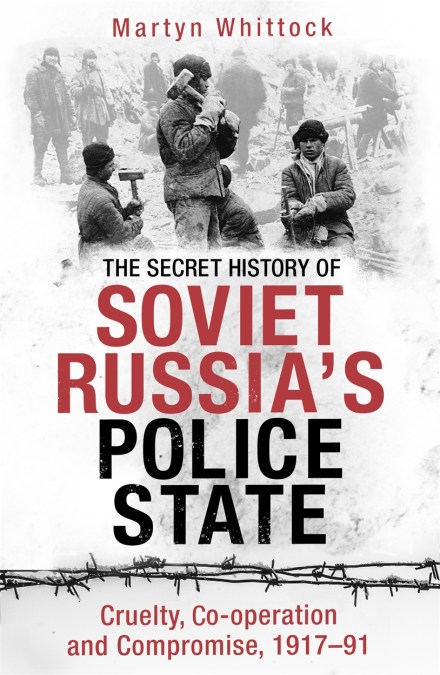‘[R]eadable and thoughtful . . . does an excellent job of exploring how the murderous political police in all its incarnations defined the Soviet Union, and left a poisonous legacy still with us today’
Professor Mark Galeotti, author of The Vory and A Short History of Russia
Repression, control, manipulation and elimination of enemies assisted in the establishment of the Soviet state, and helped maintain it in power, but could not, in the end, prevent its collapse.
Citizens of the West have, for the most part, been told a very simplified story of the repressive ‘totalitarian’ state that was the USSR. In fact, it was sustained by more than just policing and force. No amount of revisionist history can erase the reality of millions controlled, imprisoned and killed, but there was much more to the USSR’s one-party state than this. Whittock tells a more complex story of the combination of cruelty, co-operation and compromise required to build and run a one-party state. Much of this is the story of the role played by the secret police in creating and sustaining such a form of government, but it is much more than simply a ‘history of the secret police’. This is because the ‘police state’ which emerged (in which dissent, both real and imaginary, was undoubtedly policed, threatened and ruthlessly eliminated) was more than just the product of the arrests, interrogations, executions and imprisonments carried out by the secret police. The USSR was also made possible by a battle for hearts and minds which led millions of people to feel that they really had benefited from the system and had a stake in the new society.
Professor Mark Galeotti, author of The Vory and A Short History of Russia
Repression, control, manipulation and elimination of enemies assisted in the establishment of the Soviet state, and helped maintain it in power, but could not, in the end, prevent its collapse.
Citizens of the West have, for the most part, been told a very simplified story of the repressive ‘totalitarian’ state that was the USSR. In fact, it was sustained by more than just policing and force. No amount of revisionist history can erase the reality of millions controlled, imprisoned and killed, but there was much more to the USSR’s one-party state than this. Whittock tells a more complex story of the combination of cruelty, co-operation and compromise required to build and run a one-party state. Much of this is the story of the role played by the secret police in creating and sustaining such a form of government, but it is much more than simply a ‘history of the secret police’. This is because the ‘police state’ which emerged (in which dissent, both real and imaginary, was undoubtedly policed, threatened and ruthlessly eliminated) was more than just the product of the arrests, interrogations, executions and imprisonments carried out by the secret police. The USSR was also made possible by a battle for hearts and minds which led millions of people to feel that they really had benefited from the system and had a stake in the new society.
Newsletter Signup
By clicking ‘Sign Up,’ I acknowledge that I have read and agree to Hachette Book Group’s Privacy Policy and Terms of Use
Reviews
On Trump and the Puritans:
An essential and riveting read.
A classic example of how a generalist book can be actually a really good book. Whittock has got a great eye for nice vignettes, nice anecdotes that don't just entertain, but also actually illustrate wider points and precisely because he comes to it as a generalist I think he does an excellent job in distilling the big themes, the things that are important particularly in the different ages of Soviet police state and intelligence activity . . . a very readable book . . . even as something of spook wonk myself there were bits and pieces where I thought, 'Ah yes, I'd either forgotten about that or didn't know it in the first place' . . . a thoughtful piece that's done really well.
On Norse Myths & Legends (written with Hannah Whittock)
A terrific, detailed introduction of these wonderful stories and the pantheon of characters in them . . . their writing is vivid and lively . . . a great addition to any library.
On Mayflower Lives: Whittock [is] an engaging writer.
[R]eadable and thoughtful . . . does an excellent job of exploring how the murderous political police in all its incarnations defined the Soviet Union, and left a poisonous legacy still with us today.
On Christ: The First 2000 Years (written with Esther Whittock)
Intelligently written . . . informative and insightful; an excellent summary.
On Mayflower Lives:
Whittock displays a fine eye for detail.
On Trump and the Puritans (written with James Roberts):
Insightful, well-written . . . Recommended reading before a dinner party.
